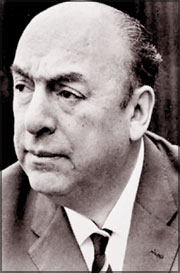 Politically
outspoken Pablo Neruda Politically
outspoken Pablo Neruda
Pablo Neruda, born in Parral, Chile is the most widely read of the
Spanish American poets. Originally named Neftali Ricardo Reyes Basoalto,
he used the pen name Pablo Neruda for over 20 years before adopting it
legally in 1946. This prolific and adventurous writer was awarded the
Nobel Prize in Literature in 1971. Neruda started to write poetry when
he was just ten years old.
Neruda’s first publication was Entusiasmo y perseverancia
(“Enthusiasm and Perseverance”), he wrote for La Matana, at the age of
13. He passed through several literary and political stages in his life.
He was in certain periods intensely political.

His poetry consistently celebrates love, nature and human experience.
In 1923 his first volume of verse, Crepusculario (Book of Twilights),
was published, followed the next year by Veinte poemas de amor y una
cancion desesperada (“Twenty Poems of Love and a Desperate Song”), which
was controversial for its eroticism, especially considering the author’s
young age. In its poems, Neruda presents woman and nature as ‘two
aspects of the same reality’ and uses nature imagery to describe women.
Neruda’s poetry of that time is extremely personal and characterized
by melancholy and a preoccupation with unrequited love. In Tentativa del
hombre infinito (“Venture of the Infinite Man”) Neruda employs freer
style and surreal imagery. This culminated in Residencia en la tierra
(“Residence on Earth”).
The poems in this collection are anguished and despairing, full of
surreal images of nature. During his exile in Mexico, due to his
allegiance to Communism which was outlawed at the time, he wrote Canto
general . The collection expresses his outrage at the Chilean political
situation in the 1940s.
It was an attempt to analyze and interpret the political and cultural
directions taken by South America. After Canto general , Neruda’s poetry
underwent an important change.
His poems took a clear and simple style to powerful effect. The poems
in Odas elementales (Elemental Odes), for instance, took as their
subjects everyday, familiar objects and elevated them. Although these
earthy, realistic poems came under critical scrutiny for being too
simple, they are considered among Neruda’s most significant works.
At the time of his death Neruda was working on his memoirs and
several volumes of poetry. Although the subjects of these collections
are similar to his previous works, they were written with the knowledge
of his imminent death. Consequently death and winter are the most
dominant themes.
Compiled by Ishara Mudugamuwa
[email protected] |
